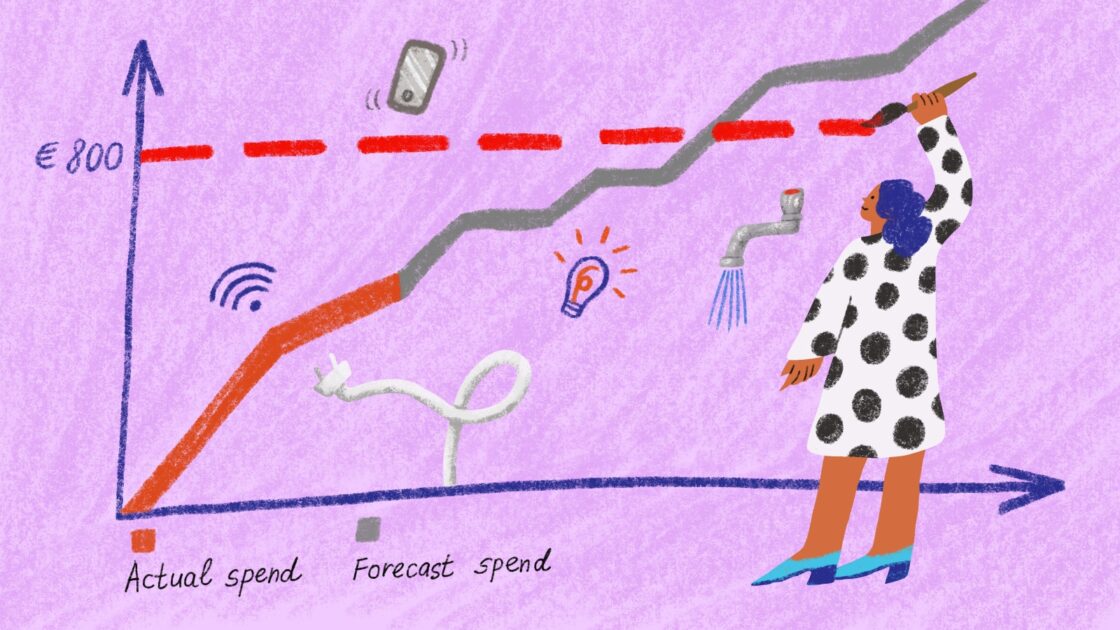How to save money on your monthly bills
There are a few things you can do to keep track of your expenses and save money on your bills

When you move out, you don’t only have rent and groceries to think about when it comes to your monthly expenses. You also need to cover bills like electricity, heating, internet, your phone, and other services you might be accessing.
Keeping on top of your bills can sometimes be overwhelming, but there are things you can do to make managing your monthly expenses less stressful and even save money along the way.
How to save money on your bills
Monthly bills can add up, and you might find you’re paying a lot for things like heating and electricity. There are a few things you can do to try and cut down those expenses.
Monitor your energy usage
Even if your bills are paid automatically each month, it can be a good idea to take a look at your statements to see exactly what you’re paying for. When it comes to heating and electricity, this can show you how much energy you’re actually using each month.
You can then start to find ways to reduce the amount of energy you use at home. This includes switching off lights when you’re not in the room, unplugging chargers when they’re not in use, switching off appliances instead of leaving them on standby, and only keeping the heating on for as long as it’s needed.
Do your research before signing up to a company
If you’re setting up an account for the first time, make sure to do your research before deciding which companies to use for different services like internet, electricity and heating. There are comparison websites available that can help you to find the best deal, and there are often discounts for first-time customers or people who switch.
Consider what it is that you need, how much you’re willing to pay, and where you can get the best price before you sign up. Look for opportunities to cut back – for example, by using 4G instead of a broadband provider, or signing up to one streaming service for, say, six months, and cancelling it before you sign up to another.
Switch your supplier to save money
In general, customer loyalty is not rewarded when it comes to utilities like phone, internet and electricity, so switching suppliers whenever your contract is up can be another great way to save money. For example, SIM-only mobile phone deals for €5 per month for the opening months are not unusual, and you can save money at the end of the introductory period by switching again to the latest offer.
If you sign up for a one year contract with one company, when the year is up you can look at what deals and offers are available elsewhere. Most companies will offer discounts for switching to their company from another provider. Once the new contract is up, you can look at switching again. Comparison websites can help you to find the best deal. You can also find out information on switching suppliers through the CCPC.
Many energy and heating suppliers are currently increasing their prices. If you are going to switch providers, ask the company you’re switching to about any recent or planned increases in their prices so you have a clearer picture of your bills into the future.
Talk to housemates about saving money
If you split the bills with other people, talk to them about all of your options for saving money on the bills. This could be reminding them to switch off lights or appliances they’re not using, or agreeing to switch to a new energy provider to get a discount. Sit them down and show them how much they could be saving each month, and hopefully they will be interested.
Managing food bills
If you’re finding it difficult to budget for food bills, there are a few things you can do. Firstly, taking time to visit different supermarkets and comparing prices of the items you buy most often can help you to work out where to get the best deal. This might mean switching where you buy your groceries, or dividing your weekly shop between two different supermarkets. Many supermarkets also sell food that is reaching its sell-by date at a reduced price – this can help you to save money, but make sure you freeze what you can before it passes its use-by date. Taking advantage of offers and deals can be great, but try to only buy things that you need instead of buying something just because it was on special. Find out more about getting the most out of your grocery shop. Making a meal plan and using your freezer can also help to reduce food waste and save money.
How to manage your monthly bills
Keeping on top of your bills each month is important to make sure you don’t fall behind. Here are some things you can do to stay on top of things:
Make a budget
If you’re feeling overwhelmed by your expenses each month, it can help to sit down and make a budget. This involves writing out all of your expenses, including essential items like rent, food, and bills, and other spending on items that are less essential.
Look at how much money you have coming in each month and compare it to the amount you have going out. Ask yourself where most of your money is going, and whether there’s anything you can cut back on. A spending calculator can be helpful with this. If your rent and bills are very high and not leaving a lot for other items, you could explore switching your accounts to try and save money.
Find out more about how to make a budget.
Set up automated payments
The best way to make sure you never miss a bill is to set up a direct debit payment so that the money automatically comes out of your bank account each month. The service provider should give you the option to set this up through your account.
Keep your direct debit payments in mind when you’re spending throughout the month – you want to make sure you have enough money in your account to cover the bill on the day the direct debit goes through. You could consider setting up a separate account for bills, making sure that you put enough money into it each month to pay all bills before any other spending.
Submit your meter readings
Sending an accurate meter reading to your energy company means your bill will be based on actual usage, not just an estimate. This will help avoid the shock of receiving a big bill later on if earlier estimates have been inaccurate.
Speak to the people you split the bills with
If you are sharing a house or apartment with others, it’s important to agree in advance how bills will be paid, whose name is on the account, and how others in the house will pay their share. Apps like Revolut can make it easier to send and request money. If someone else in the house is paying the bills each month, try to be on time when it comes to paying your share. If the bills are in your name and you’re having issues getting the money from housemates, talk to them about it and try to come to an arrangement for the money to be sent to you each month.
Read more about dealing with issues with housemates and learn about your rights as a tenant.
What to do if you’re feeling overwhelmed by your monthly expenses
Struggling with money can be a really stressful experience. If you’re feeling overwhelmed by your finances, know that there is support available.
Find out what to do if you’re experiencing financial stress.
The following services can offer you support if you are worried about money:
- MABS offers advice on money management
- The Society of St. Vincent De Paul helps people with financial difficulties
- Threshold provides a tenancy support service for people at risk of losing their home
You could also contact our free and confidential text support service 50808:
Illustrations by Marina Marinina.
Feeling overwhelmed and want to talk to someone?
- Get anonymous support 24/7 with our text message support service
- Connect with a trained volunteer who will listen to you, and help you to move forward feeling better
- Whatsapp us now or free-text SPUNOUT to 50808 to begin.
- Find out more about our text message support service
If you are a customer of the 48 or An Post network or cannot get through using the ‘50808’ short code please text HELLO to 086 1800 280 (standard message rates may apply). Some smaller networks do not support short codes like ‘50808’.
Need more information, advice or guidance?
We offer information, advice and guidance about the issues that matter to you. Our online Youth Information Chat service is for 16 to 25 year olds and is available Monday to Friday, 4pm to 8pm (excluding Bank Holidays).






